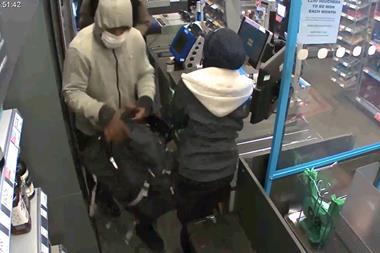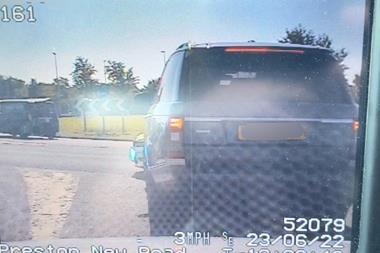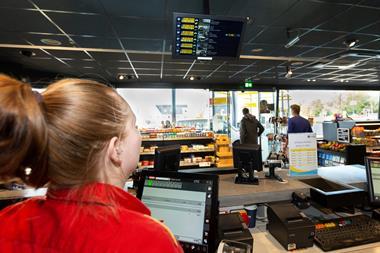When it comes to forecourt security, the most expensive and vulnerable commodity is the fuel itself.
Gareth Jenkins, business account manager at Fairbanks, comments: "In an age of soaring fuel prices and recession-weary customers, wet-stock theft is alive and well, yet there are seldom any services that can warn you of the issue. But our company does offer a solution."
That solution is a remote wet-stock monitoring service that integrates with an automatic gauge system.
This means Fairbanks can relay information 24 hours a day to forecourt owners about their fuel activity.
"Our systems have the capacity to automatically forward any gauge alarms via text, phone call or email, so that the issue can be investigated as soon as possible. This includes alarms such as sudden loss, night-time loss and fuel theft alerts that otherwise cannot be heard by sites that are closed overnight, where fuel theft is most common.
"We’re also able to offer a further, preventative measure to ward off fuel thieves. Upon request we will install a klaxon, which will sound (quite startlingly) as soon as a fuel theft is detected by the gauge. This can be coupled with a strobe lighting alarm, to ensure that stealing fuel is incredibly troublesome for the criminal."
The company boasts great success in the reduction of fuel theft during opening and closing hours thanks to its systems. Just weeks ago, a Fairbanks customer experienced a fuel theft in the early hours of one Saturday morning. CCTV footage showed that the thieves had tampered with the floodlights so that the crime and their identities were all but hidden in the darkness. In fact over 2,000 litres of fuel was pumped out over a one-hour period. And data revealed that the pumping stopped for a few minutes half-way through a sign that the criminals needed to change the vessel they were filling. It could have been much worse as there was still another 16,000 litres underground.
Thankfully the forecourt owners are now better protected as their Fairbanks system will alert them the next time the stock levels drop at night.
Simple methods
John Tierney, product manager at Gilbarco, reckons there are many different but simple methods that forecourt operators can use to lessen the risk of fuel theft.
"One way is to physically secure and electronically alarm the fuel dispenser, with the lock playing the job of the primary defence and the alarm the secondary.
"All dispensers come with a lock from the factory, which is usually a common key. It is recommended that operators should have one set of keys for the site or network, and that the distribution of these keys is controlled. The areas of vulnerability on a dispenser are the electronics and hydraulics."
Tierney says security of the dispenser can also be improved by installing sensors or switches that sound an alarm when someone is accessing the equipment or it is being tampered with. "These can alert the site owner or operator when someone is working on the forecourt equipment or when there is unauthorised access to it. The system can be programmed to send a text message alert to a designated mobile phone or display an alert on the POS display. In addition, access to the dispenser doors is recorded in the log of the electronics to provide traceability and better control."
Tierney adds that Gilbarco Veeder-Root is in advanced trials for its Secure Interface Pulser (SIP) or secured encoder. He says this will be an industry ’first’ in providing end-to-end encryption from the meter to the electronic head. "It has a unique asset ID which is embedded in the electronics of the dispenser and an unauthorised replacement of the pulser will result in an error. The SIP pulser also has lift-off detection and the software has a no pulse, no flow parameter."
Michael Harris, managing director at WashTec says the contribution that a good security system can make to a fuel forecourt business has evolved significantly in recent years and now goes far beyond the core capability of simply recording the movements of cars and people.
"Digital recording techniques now allow up-to-date security management systems to intelligently interpret activities that take place on a forecourt site and recommend appropriate actions for site managers. For example, our PumpWatch system, developed by our Dutch partner BigBrother, is aware of a wide range of activities that may take place on a site and can link connected events together to allow the full story of an incident to be told.
"The system allows rapid access to these events, so that when an incident whether a drive-off, HSE scare or vandalism is triggered, it can point the manager towards the key images and a file can be quickly prepared to report the issue to the police."
Queenborough Service Station in Kent, part of Top 50 Indie George Hammond, uses the WashTec security system.
At its heart is PumpWatch, which is connected to the fuel controller and allows image searches via pump number, receipt number, vehicle registration, date and time. Drive-offs and "no means of payment" incidents can swiftly be stored in the ’Black List’ function, reducing the risk of repeated drive-offs. Details of images and transactions can be shared easily with debt recovery agencies.
The on-site management team at the Queenborough site is very positive about the system, as the flexible monitoring and simple operating procedures allows them to work with increased confidence and efficiency.
John Ryeland, retail operations managing director of George Hammond, says: "The WashTec BigBrother system is tailored for the world in which we operate on our forecourts. Its capability to link to our fuel controls systems coupled with its well-designed search functions gives us confidence that we can identify and investigate security concerns when they occur."
Another site using PumpWatch is award-winning Parkfoot Garage, also in Kent, run by David Charman.
Integration with David’s car-washing equipment means that all vehicles using his two WashTec SoftCare Pro Touchless machines, and two WashTec Prisma jet wash machines are covered by the system. Images of cars entering and using the wash equipment are saved with a copy of the licence plate, which allows site staff to validate any claims of damage from customers. In addition, PumpWatch is continuously building a clear picture of who is using the site and for what purpose.
Bulk theft
Kevin Eastwood, executive director of the British Oil Security Syndicate (BOSS), says an emerging problem that’s gained public attention is bulk fuel theft. "These incidents in which criminals steal thousands of litres from storage tanks are not common but for the retailers concerned can involve devastating losses.
"BOSS shares data and intelligence on this issue with police forces and we’re fast learning lessons. It’s clear that non-24-hour sites are the most vulnerable, but relatively simple security upgrades can be a major deterrent to thieves.
"These include such measures as additional physical security for access to tank-fill points, and improving CCTV and lighting to cover tank manholes. More sophisticated technology, such as that being introduced by some oil companies, can alert site staff by SMS in real time if a large loss of fuel in a short time is detected."
Finally, WashTec’s Harris says security equipment can now even be used to help increase sales and profits.
"Our BigBrother system extends the value that ANPR can bring to the business by analysing customer behaviour. For example, by linking cameras looking at the pump positions, shop stock and car washing machines, the system can identify areas of forecourt business which can be increased. This means a loyal fuel customer who does not use the site’s car wash can be quickly identified and targeted for a special promotion. This application of business intelligence using the observational capabilities of the site’s security system is a novel and sensible extension of a system that is already recognised as essential for forecourt businesses. Most CCTV systems are recording legal customer activities something that is not of interest to a conventional security system. BigBrother can make good use of every recorded observation."
tackling e-crimes
Poacher turned gamekeeper Tony Sales (pictured above), who was once dubbed ’Britain’s Greatest Fraudster’, is now helping retailers fight identity fraud and theft. And with so-called ’e-crimes’ now accounting for 37% of all losses from retailers (BRC Retail Crime Survey) his knowledge is in demand.
Sales, who works for Retail Fraud Uncovered, recently shocked an audience of loss prevention experts, by showing how fraudsters are defeating Chip and PIN with nothing more than a domestic iron and a tin of full fat custard. The custard itself was not used, but the tin was the right weight to roll out numbers from one card to another.
One of Sales’ recent engagements was at the Retail Fraud Show where he spoke about his new staff training programme, designed to stop retail staff accepting fake credit cards, ID and documentation. It is estimated that such fakes are used in more than 60% of all frauds, according to a recent survey by fraud prevention service CIFAS, costing retailers hundreds of millions every year.
Big BOSS achievements
The British Oil Security Syndicate (BOSS) has worked alongside the Crown Prosecution Service (CPS) to formulate new guidelines for the prosecution of persistent ’no means of payment’ offenders. The guidance to CPS prosecutors advises them how to bring criminal charges against repeat offenders. This will make it quite clear that motorists dishonestly evading payment can now be prosecuted. For more details see News Extra on page 10.
BOSS has also achieved a major success on behalf of all UK fuel retailers by securing an agreement from the DVLA that allows service stations to request registered vehicle keeper details from its database. Previously retailers had been unable to obtain details from the DVLA when a driver filled up with fuel but only paid for shop items, as the non-payment for fuel was invariably deemed a cashier error by police and the DVLA.
So far this year, several major independents including MRH, Sewell Retail and the Midlands Co-operative Society have signed up to Payment Watch, meaning that more than 1,600 service stations are now BOSS Payment Watch members.
BOSS is working closely with the Home Office’s National Fraud Authority to assist in developing its Action Fraud online intelligence gathering initiative. This scheme collects and links information about suspected multiple offenders to provide a single, coherent package of evidence to the police, leading to faster and more effective action. An advantage of Action Fraud is that suspects’ details are checked against other intelligence and retained in the event of future offending. BOSS has identified more than 600 cases of this type of serial ’no means of payment’ offending and these are now included in over 500 case files. More than 180 cases have so far resulted in a positive police outcome, with many others at various stages of prosecution.
Payment Watch BOSS has launched a new electronic portal that enables fuel retailers to report details of ’no means of payment’ incidents online quickly and easily, along with relevant supporting evidence, all to increase the chances of recovering the debt.
BOSS has so far established more than 125 Forecourt Watch schemes throughout the UK. Forecourt Watch has proved highly successful in reducing losses and associated bureaucracy for retailers. In areas where schemes operate, forecourt crime can fall by up to 55%.
BOSS is developing a nationwide database of registration marks of vehicles known to be associated with incidents of non-payment. When developed, retailers will be able to link automatic number plate recognition (ANPR) systems to this database, giving them immediate warning if a vehicle on the database enters their site. In such cases site staff will have the option of requiring pre-payment from the motorist.
BOSS is supporting Operation Liberal, a nationwide policing and intelligence-sharing initiative tackling ’travelling criminality’ including fuel crime, as well as other forms of rogue trading. The organisation is also in the final stages of concluding an information sharing agreement with the Association of Chief Police Officers Vehicle Crime Intelligence Service (AVCIS) that will enable the wider circulation of vehicles of interest, particularly with regards to linking vehicles that owe money for fuel to be linked to other criminality. BOSS is also working with the Central Motorway Police Group to tackle incidents of bulk fuel theft.






























No comments yet